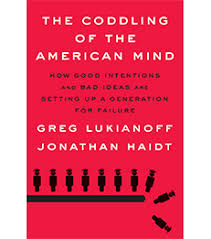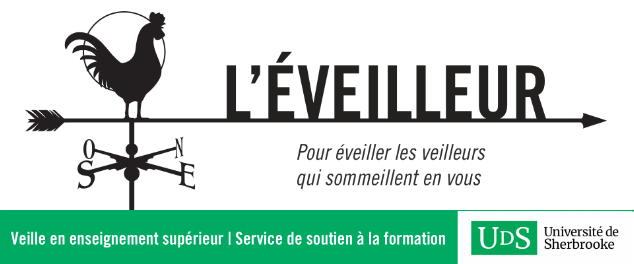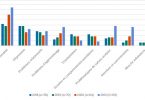 Du point de vue de certains intellectuels de gauche (Wengel, Warner), le livre The Coddling of the American Mind: How Good Intentions and Bad Ideas Are Setting Up a Generation for Failure de Lukianoff et Haidt semble être le brûlot de la rentrée. Greg Lukianoff est avocat et président de FIRE (Foundation for Individual Rights in Education), tandis que Jonathan Haidt est psychologue social et professeur à la Stern School of Business de l’Université de New York. Haidt avait déjà publié en 2012 The Righteous Mind, un ouvrage sur la politique et la religion où il cherchait “un terrain d’entente entre la droite et la gauche”.
Du point de vue de certains intellectuels de gauche (Wengel, Warner), le livre The Coddling of the American Mind: How Good Intentions and Bad Ideas Are Setting Up a Generation for Failure de Lukianoff et Haidt semble être le brûlot de la rentrée. Greg Lukianoff est avocat et président de FIRE (Foundation for Individual Rights in Education), tandis que Jonathan Haidt est psychologue social et professeur à la Stern School of Business de l’Université de New York. Haidt avait déjà publié en 2012 The Righteous Mind, un ouvrage sur la politique et la religion où il cherchait “un terrain d’entente entre la droite et la gauche”.
Comme le résume bien Wengel (2018), The Coddling of the American Mind est un livre sur les raisons pour lesquelles les jeunes gens sont anxieux et sur comment l’université empire les choses (“a book about why young people feel anxious and college is making it worse.“) L’ouvrage s’interroge sur le “mystère” des jeunes de la génération Y qui refusent d’être exposés à des idées “agressantes”. Pourquoi sont-ils différents des cohortes précédentes? “Pourquoi cette nouvelle culture morale est-elle arrivée si vite ? D’où vient-elle ?” (“Why did this new moral culture come in so quickly? Where did it come from?”)
En 2016, un essai des auteurs portant le même titre que le livre avait été publié en couverture du magazine The Atlantic et était devenu viral. Il dénonçait notamment les “microagressions” et les avertissements avant un cours (“trigger warnings“). Le livre n’était pas loin… Dans une vidéo, Haidt explique que l’ouvrage dénonce d’emblée trois grandes “faussetés” (untruths) que les étudiants d’aujourd’hui apprennent sur les campus – et qui peuvent à terme nuire à leur santé mentale:
- What doesn’t kill me makes me weaker. Les auteurs pensent au contraire que les étudiants doivent être confronter à des notions qui les obligent à se positionner, quitte à vivre de l’inconfort.
- Always trust your feelings. Pour les auteurs, c’est l’équivalent de dire aux étudiants qu’il est acceptable que leurs émotions et leur subjectivité colorent leur perception du monde et des conflits.
- Life is a battle between good people and evil people. Cette tendance à démoniser les gens aux opinions différentes des siennes ne permet pas les débats.
L’ouvrage de Lukianoff et Haidt ne blâme pas les milléniaux mais plutôt la génération X, les adultes qui les ont précédés et qui ne mettent pas assez de limites aux demandes de sécurité des étudiants. Les Y sont perçus comme des victimes d’avoir été mal encadrés par leurs prédécesseurs:
…[D]espite the title, students are never actually portrayed as “coddled” or “entitled.” Rather, the authors’ primary focus is on enhancing the well-being of “iGen” students who Haidt and Lukianoff recognize are more anxious and depressed with every successive year. (Warner, 2018)
C’est le cas des professeurs, notamment des professeurs de sciences humaines [sic]:
Yet Haidt also sees faculty as very much part of the problem. While acknowledging that the vast majority of professors “go to work in the morning trying to figure out what the truth is”, he suspects that “in schools of education and social work, in departments of media studies, anthropology and many of the literary fields, the goal of fighting oppression is at least equal and sometimes superior to the search for truth. This is a small minority of the university, but they have a lot of influence on what can be said publicly, because they come down savagely on people in other departments who violate their sacred values.” (Reisz, 2018a)
C’est aussi la responsabilité de leurs parents:
…Many parents have adopted a paranoid style of child-rearing “wildly out of sync with the actual risk that strangers pose to children”. The middle classes prioritise music lessons, team sports and other supervised activities that might look good on an application form for an elite university over the kind of unsupervised free play that lets kids “enjoy a healthy amount of risk” and learn life skills for themselves. All this has had a major impact on the “fragility” and lack of openness to alternative perspectives of students now attending universities. (Reisz, 2018a)
Comme on l’a souvent décrié, on aurait oublié de laisser ces jeunes se tromper et apprendre de leurs erreurs tant on a voulu les protéger contre le monde et contre eux-mêmes:
Colleges now have dedicated programs to help students to learn the benefits of “failure.” Students need them because many have never been given the space to fail and learn from those failures. They’ve also been given very little room to engage with and pursue their own passions in the context of school. (Warner, 2018)
À l’inverse, l’université devrait être un lieu sécuritaire où les étudiants peuvent expérimenter et se confronter à des idées opposées aux leurs afin de se préparer à la variété d’opinions qu’ils rencontreront sur le marché du travail et dans la vie citoyenne:
At a time when he feels “extremely pessimistic, almost to the point of panic, about the future of American democracy”, Haidt would dearly like universities to assume their role as “the pre-eminent institutions preparing students to encounter political differences and work with each other in a democratic framework. Right now, I think many universities are making things worse, not better.” (Reisz, 2018a)
Attempts to shield students from words, ideas, and people that might cause them emotional discomfort are bad for the students. They are bad for the workplace, which will be mired in unending litigation if student expectations of safety are carried forward. And they are bad for American democracy, which is already paralyzed by worsening partisanship. […]
Rather than trying to protect students from words and ideas that they will inevitably encounter, colleges should do all they can to equip students to thrive in a world full of words and ideas that they cannot control… (Lukianoff et Haidt, 2015)
Warner et Wendel critiquent toutefois The Coddling of the American Mind parce qu’il n’aborde pas de front la raison pour laquelle les milléniaux seraient aussi fragiles. Chez Warner, l’explication est économique alors que nombre d’étudiants vivent une précarité financière qui les empêche d’avoir le recul nécessaire pour débattre de façon posée. Chez Wendel, Lukianoff et Haidt – des blancs éduqués et privilégiés – peuvent difficilement comprendre la nouvelle réalité d’étudiants de première génération, souvent issus des minorités.
Sources:
Greenberg, Bob, Jonathan Haidt – The Coddling of the American Mind (vidéo), The Brainwaves Video Anthology, YouTube, 3 sept. 2018 (durée: 5 min 49)
Lukianoff, Greg et Jonathan Haidt, “The Coddling of the American Mind“, The Atlantic, septembre 2015
Reisz, Matthew, “The Fragile Generation and the Coddling of Young Minds“, Times Higher Education, 6 septembre 2018a
Reisz, Matthew, “Jonathan Haidt on a Fragile Generation of Students“, Times Higher Education, 6 septembre 2018b
The Atlantic, “How America Reacted to ‘The Coddling of the American Mind‘” (vidéo), YouTube, 14 mars 2016 (durée: 9 min 54)
Warner, James, “A Million Thoughts on ‘The Coddling of the American Mind’“, Inside Higher Ed, 18 septembre 2018
Wengel, Moira, “The Coddling of the American Mind review – how elite US liberals have turned rightwards“, The Guardian, 20 septembre 2019






